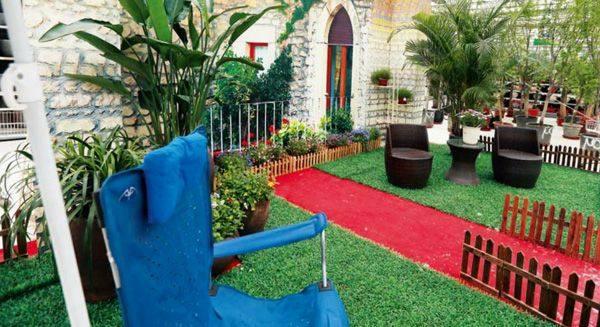Blossoming Business
by Huang Liwei
In the Ming (1368-1644) and Qing (1644-1911) dynasties, aristocrats were already enjoying the flowers of Huaxiang in Fengtai District of southwestern Beijing, and today people from all walks of life can savor their splendor. Literally translated to “township of flowers,” Huaxiang gained its sterling reputation during the dynastic era. Now, embraced by a wave of urban gardeners eager to spruce up their balconies and courtyards, the historic township has become an integrated flower and plant base with multiple markets specializing in production, sales, and entertainment, seeing more momentum than it has in years.
Removed from the muted tones of the asphalt jungle in downtown Beijing, the bright colors of various flower markets stand out amidst the forests of high-rises lining the South Fourth Ring Road. At the heart of Huaxiangs flower district, Century OBridge Garden Center attracts steady streams of gardening fans with its unique sales style.
Thousands of varieties of foliage on display in the 4,000-square-meter market place are all labeled with a unique ID noting the species and required care. At the garden center, customers can get everything they need for gardening at a single superstore. Showrooms demonstrating concepts for balconies and courtyards in both Chinese and Western styles lure newcomers to the hobby, help customers decide on purchases, and inspire custom-made solutions.
Inside, both temperature and humidity are kept constant by special equipment to maintain an optimal growing environment. A walk through the garden center smells as fresh as the most pristine forest, but with even greater diversity. Visitors are mesmerized by various artistic and grower-friendly “green goods” ranging from high-end “professional” flowers and plants to miniature hydroponic flowers and cartoonish potted plants.
A subsidiary of Beijing-based Green Garden Group, Century OBridge Garden Center was established in May 2009 by the team that distributed flowers during the 2008 Beijing Olympics. The center took the lead in China to adopt the Western sales mode by standardizing and integrating its products into a big-box store to provide a “one-stop” shopping experience for gardening enthusiasts.
Although such enterprises are already ubiquitous in European and American countries, the concept of a gardening “supercenter”was new to Chinese consumers when it was first introduced by Century OBridge. In its early days, Century OBridge Garden Center didnt receive much attention and some worried about its future. However, after years of operation, the center is now increasingly beloved by gardening fans as passion for amateur gardening increases and consumption habits change.
Wu Rui, a young university graduate with great passion for gardening, is the manager of Century OBridge Garden Center. After studying Ornamental Horticulture at the Chinese Academy of Agricultural Sciences, Wu chose to work in gardening and flower production and sales rather than heading to a scientific research institute like many of her classmates. Having witnessed the increasing demand for gardening and flower during years of working, Wu has much to say about the market. “Customer volume has been about 200 per day, higher on holidays, since 2011, which is already double what we were seeing when it had just opened,” revealed Wu. “One factor is city dwellers increasing interest in home design. More importantly, our unique sales mode, which optimizes the shopping experience by providing a comfortable and convenient environment, is gaining more and more popularity among gardeners.”

As urban demand for flowers and plants continues blooming, many farmers have started growing flowers and plants on their farmland to feed the market. Meanwhile, shortcomings of the old-fashioned sales mode involving myriad steps (e.g. production, transportation, storage, handling, packaging and distribution) is be-coming more obvious, evidenced by continuously increased costs as well as elevated attrition rate of products.
Regardless of its notable advantages in terms of standardization and integration enabled by the big-box sales mode, Century OBridge Garden Centers success could not be sustained without Beijing-based Green Garden Group. The parent company of Century OBridge, Green Garden Group operates a state-of-the-art greenhouse near Centurys market, where products are ware- housed. “The soil we use for these seedlings actually comes from Denmark,” noted a greenhouse employee. “It can effectively avert disease and pests, increasing the survival rate.” According to Wu Rui, most greenhouse employees are local villagers from Huaxiang Township. As representatives of Green Garden Group equipped with time-honored gardening techniques, they all play important roles in Huaxiangs prosperous flower industry within todays more scientific and effective production and sales mechanism.

